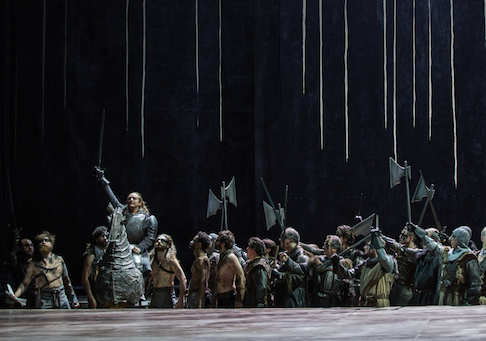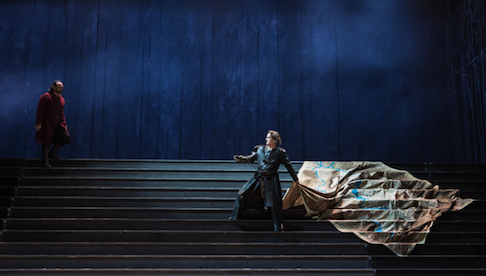29 Jan 2018
The Bandits in Rome
AKA I masnadieri, rare early Verdi, though not as rare as Alzira. In 1847 London’s Her Majesty’s Theatre commissioned the newly famous Verdi to write this opera for the London debut of Swedish soprano Jenny Lind.

AKA I masnadieri, rare early Verdi, though not as rare as Alzira. In 1847 London’s Her Majesty’s Theatre commissioned the newly famous Verdi to write this opera for the London debut of Swedish soprano Jenny Lind.
And to this day “Tu del mio Carlo al seno” and its cabaletta remain a showpiece for sopranos, not to mention the “Parea mi che sorto da lauto convito” that is a blockbuster showpiece for baritones. There is even a greater amount of splendid music for tenor, starting with the opera’s initial scene “O mio castel paterno” that creates the situation that will result in the brutal murder of the soprano.
Just now in Rome the tenor Carlo, yearning for his childhood home, was sequestered up on some sort of rolling scaffold on the side of the stage for this first scene (and most of the opera), but upon learning that his father has disinherited him he vowed to remain in a band of robbers who plunder the countryside (and in this production brutally rape women). The robbers rose magically on one of Teatro Costanzi’s famous full stage elevators and he agreed to become their leader.
 Carlo (Stefano Secco) becoming leader of Verdi's bandits
Carlo (Stefano Secco) becoming leader of Verdi's bandits
Meanwhile we learn that the baritone had deceived the tenor. The tenor had not been disinherited after all, he could in fact have renounced his dissolute life and returned home. The problem now becomes the tenor’s sworn loyalty to his band of robbers, not to mention that the soprano from his former upright life loves him. Unfortunately the conniving baritone wants to marry her. So there was a lot to sing about.
The metteur en scène of this new production was popular 57 year-old Italian actor and voiceover artist (for dubbing films) Massimo Popolizio. Mr. Popolizio made his directorial debut only last year with Author Miller’s 1968 play The Price. Mr. Popolizio is said to have based his staging of The Bandits on the popular U.S. TV series Game of Thrones. Maybe this explains the several scenes of gratuitous gang rape. Unlike the well developed threads of Game of Thrones, Mr. Popolizio left Verdi’s admittedly worst libretto without a discernible story line. We will never know from Mr. Popolizio why Carlo (the tenor) murdered Amalia (the soprano) just after their ardent declaration of love.
It was an an evening about singing, not about theater. After overcoming quite deserved opening night nerves the mostly Italian cast sang stylishly. Unfortunately tenor Stefano Secco (San Francisco’s 2014 Pinkerton) as Schiller’s questionable hero Carlo did not deliver the opening scene with sufficient pizazz to impress the audience which, despite his intense and eloquent (though small scale) delivery of the third act, awarded him vociferous boos at the final bows.
Twenty-nine year old ingenue diva Roberta Mantegna, a recent graduate of Rome Opera’s new young artist program, negotiated Amalia’s treacherous outpourings with knowing aplomb, belying the fact that this was her debut in a major role on a major stage. Additional maturity of voice will add effect to her Amalia.
 Francesco (Artur Ruciński) beginning “Parea mi che sorto da lauto convito”
Francesco (Artur Ruciński) beginning “Parea mi che sorto da lauto convito”
Polish baritone Artur Ruciński, San Francisco Opera’s recent Germont, gave an impressive account of the repentant Francesco’s big scene, his fine diction finding its intimacy rather than its bravura. The role of Massimiliano, Carlo and Francesco’s feeble father, was competently delivered by ubiquitous bass Ricardo Zanellato.
Conductor Roberto Abbado exhibited little affection for early Verdi, and had no patience for attempting ensemble in the extended scenes with the male chorus.
Michael Milenski
Cast and production information:
Massimiliano: Riccardo Zanellato; Carlo: Stefano Secco; Francesco: Artur Ruciński; Amalia: Roberta Mantegna; Arminio: Saverio Fiore; Moser: Dario Russo; Rolla: Pietro Picone. Orchestra and Chorus of the Teatro dell’opera di Roma. Conductor: Roberto Abbado; Metteur en scène: Maurizio Popolizio; Set designer: Sergio Tramonti; Costumres: Silvia Aymonino; Lighting: Robert Venturi. Video: Luca Brinchi and Daniele Spanò. Teatro Costanzi. Rome, January 21, 2018